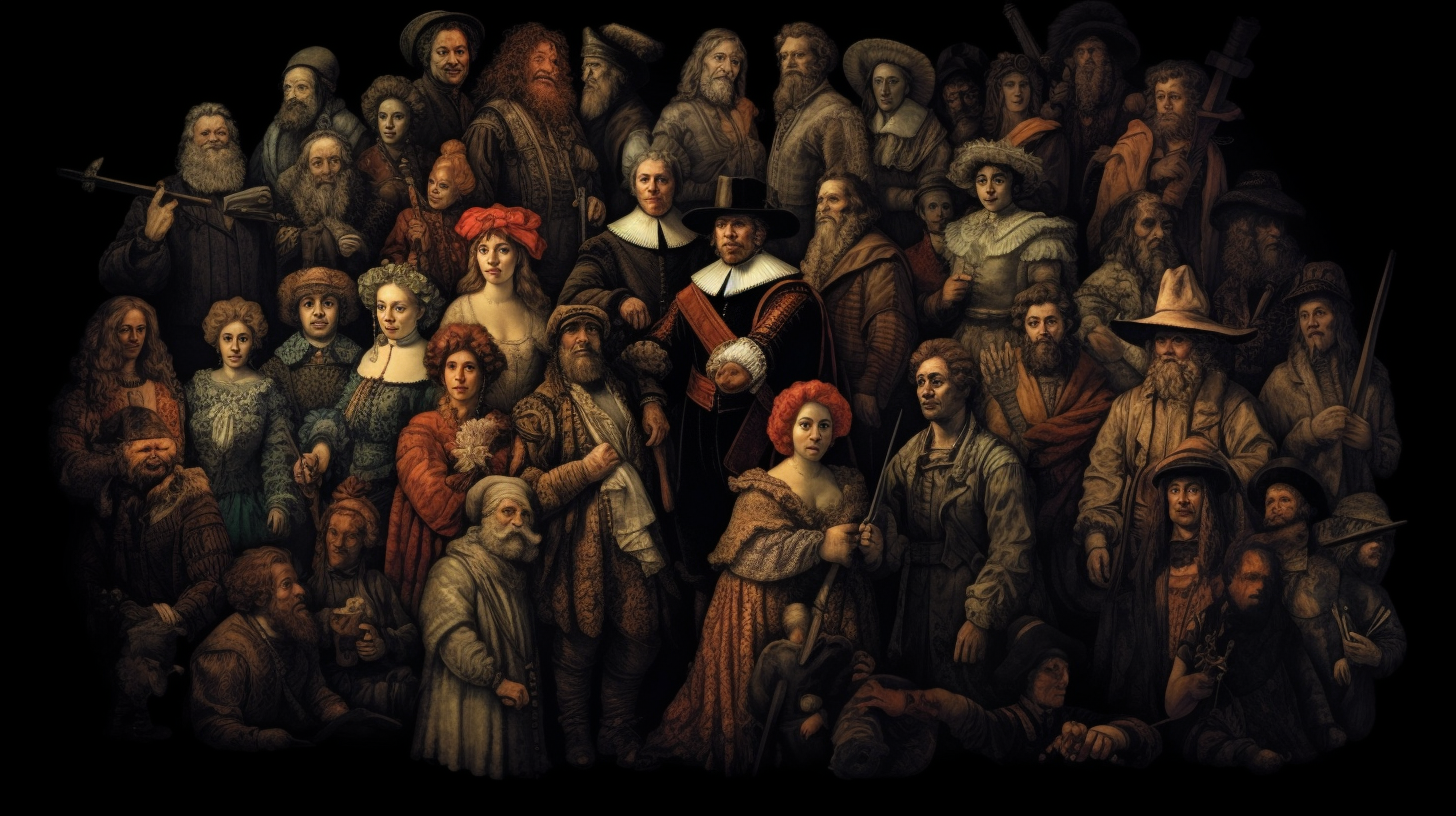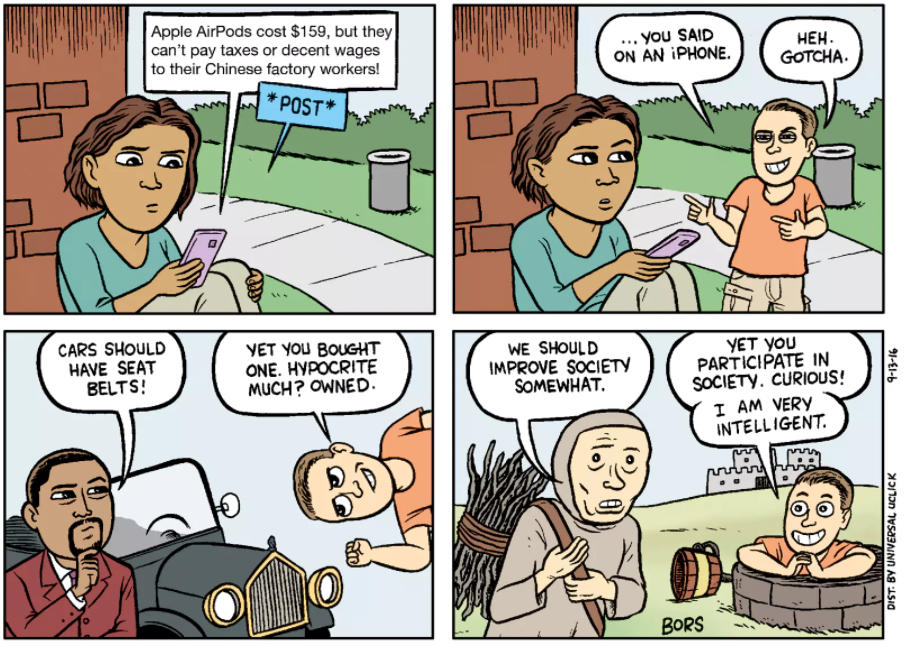
Moderation and Moderate Communities
Moderation is a difficult good. Which is why I watched, curiously, amused, mystified, at Reddit CEO Steve Huffman’s behaviour in June, 2023.
NBC News reported: “Reddit CEO slams protest leaders, saying he’ll change rules that favor ‘landed gentry’: Steve Huffman, the Reddit CEO, told NBC News in an interview that a user protest on the site this week is led by a minority of moderators and doesn’t have wide support.”

Reddit has a system that creates a system by which moderators, creators, and lurkers learn about their preferences, share knowledge, and share knowledge about sharing knowledge. It’s delicate. It’s reddit’s core asset.
Which is why I’ve been mystified by Huffman’s behaviour.
Let’s zoom out and look at Moderation and the nature of Moderate Communities.
I’ll start way up at a first principle that math [0] and by extension, language itself is ambiguous, incomplete, and inconsistent. Therein lies the beauty and catastrophe of human existence. Nobody can create a system of heuristics out of language that unto itself is perfectly consistent because the physics of this Universe literally don’t allow it. So nobody can ever behave perfectly consistently within themselves. This constraint applies to groups of people [1]. Heterogeneity springs from the Universe itself. Abandon hope all ye who enter here.
The motivations for engaging in communities are heterogenous, so right from the start, dialogue about what a community is designed to do is heterogenous. As a result, a community is a fuzzy environment [2]. The core capability of using tools to learn about a fuzzy environment, both from within it and outside it, are distributed heterogeneously across the population. Some people are more comfortable at using the tools than others, just as some are more comfortable playing the piano than others. Learning about both your own preferences, the preferences of others, coordinating perspectives, synthesizing that knowledge into policy, and applying it in accordance with policy preferences, is a chain of activity that is difficult alone and in group leadership contexts [3]. All the while, groups become their worst enemies as they evolve [4], and therein lies the seeds of its destruction. Contradictions between what the community regards as knowledge and reality accumulate to the point that the knowledge community can’t hold itself together. The community is transformed or fractures, sometimes resulting a paradigm shift [5].
One might squint and say that the root of the problem is clear right from the start, isn’t it? The problem is in the heterogeneity! Depending on which view of the Universe you subscribe to, perhaps a singularity only happened once, hasn’t happened yet, will never happen, or it has happened an uncountable number of times already. In all cases, we’re here now and for our own reasons that are inconsistent even to ourselves, we engage in dialogue and build communities.
I’m arguing here that the roots of the problem are worse than a tangled mesh buried in concrete, lead, and uranium. The roots of the problem are buried in the fibre of the Universe itself. Instead of leaping straight to the leaves of the problem, I’ll raise my eyes just a little bit up.
One might squint a little bit harder and see that the trunk of the problem is clear, it’s in how the preferences of a community are aggregated, constituted, and applied. How do we, as a group of people in dialogue with one another, want to engage the beauty, horror, and beauty of such a fuzzy environment? How we gain the knowledge of knowing how to distinguish what is knowledge and what is not?
There’s a way we like to operate in The West. Starving to death sucks. And famine was happening a lot. So we started an effort to isolate the reasons why crops grow and why they don’t. We organized. Then we organized reality so we could control as many variables as possible. This impulse reaches its height with the Randomized Control Trial (RCT). Then we organized communities to look at the data and decide what is truth and what isn’t. And we got extreme with it. We organized forests of all things, planting trees in straight lines, planted children in straight lined desks and give them all the same tests, and planted ideas in straight lined newsfeeds and even called those communities. We control variables to understand them.
And for the most part it has worked. I like Canada – with nutrition in my body, heat on my skin in winter, air conditioning in summer, I get a ballot to hire people, I don’t fear cholera, smallpox or the plague, and from time to get to eat cheese and apple slices while flying 36,000 feet above the ground at 871 km/h. I don’t remember a famine in my lifetime. Science, patience, and learning about our ourselves in fuzzy environments has generally made our condition, and society, somewhat better. It has been effective. We could continue accumulating knowledge to make society, and the communities we live in (both meatspace and cyberspace), better.

And we’re learning more about ourselves in these social spaces [6].
In aggregate, we know that output of moderation works because some communities continue to create value. The process to get moderation to work better, or more often, is quite a bit trickier. There’s so much failure. There are so many false starts. There’s a bit of a power-law distribution when it comes to encouraging moderate communities to come into being, isn’t there? It’s still relatively rare that a community delivers aggregate social utility to its members, sustainably, or a moderate-run of time. What can be done to improve society somewhat?
I argue that it’s worth the effort to organize the knowledge about moderation because it’s at the trunk of what we do, given the beauty and existential catastrophe at the roots.
Which is why I’m mystified by Huffman’s behaviour. Reddit is a system that creates a massive amount of metadata about metadata, and he appears to be undermining the core system that generates the underlying asset value. It’s bizarre and I don’t understand it – not from a neoliberal business perspective, or a management science perspective [7] or from any philosophy that I understand.
I wonder where the next great laboratory for moderate communities will emerge. It’s worth the effort.
Sources
[0] Kurt Gödel (1931) “Über formal unentscheidbare Sätze der Principia Mathematica und verwandter Systeme, I”, Monatshefte für Mathematik und Physik, v. 38 n. 1, pp. 173–198.
[1] Arrow, K. J. (1951). Social choice and individual values (Vol. 12). Yale university press.
[2] Bellman, R. E., & Zadeh, L. A. (1970). Decision-making in a fuzzy environment. Management science, 17(4), B-141.
[3] Zhu, H., Kraut, R., & Kittur, A. (2012, February). Effectiveness of shared leadership in online communities. In Proceedings of the ACM 2012 conference on computer supported cooperative work (pp. 407-416).
[4] Shirky, C. (2005). A group is its own worst enemy. The best software writing I, 183-209.
[5] Kuhn, T. S. (1962). The Structure of Scientific Revolutions. Chicago (University of Chicago Press) 1962.
[6] Aral, S. (2021). The hype machine: how social media disrupts our elections, our economy, and our health–and how we must adapt. Currency.
[7] Goldfarb, A., & Xiao, M. (2011). Who thinks about the competition? Managerial ability and strategic entry in US local telephone markets. American Economic Review, 101(7), 3130-3161.
